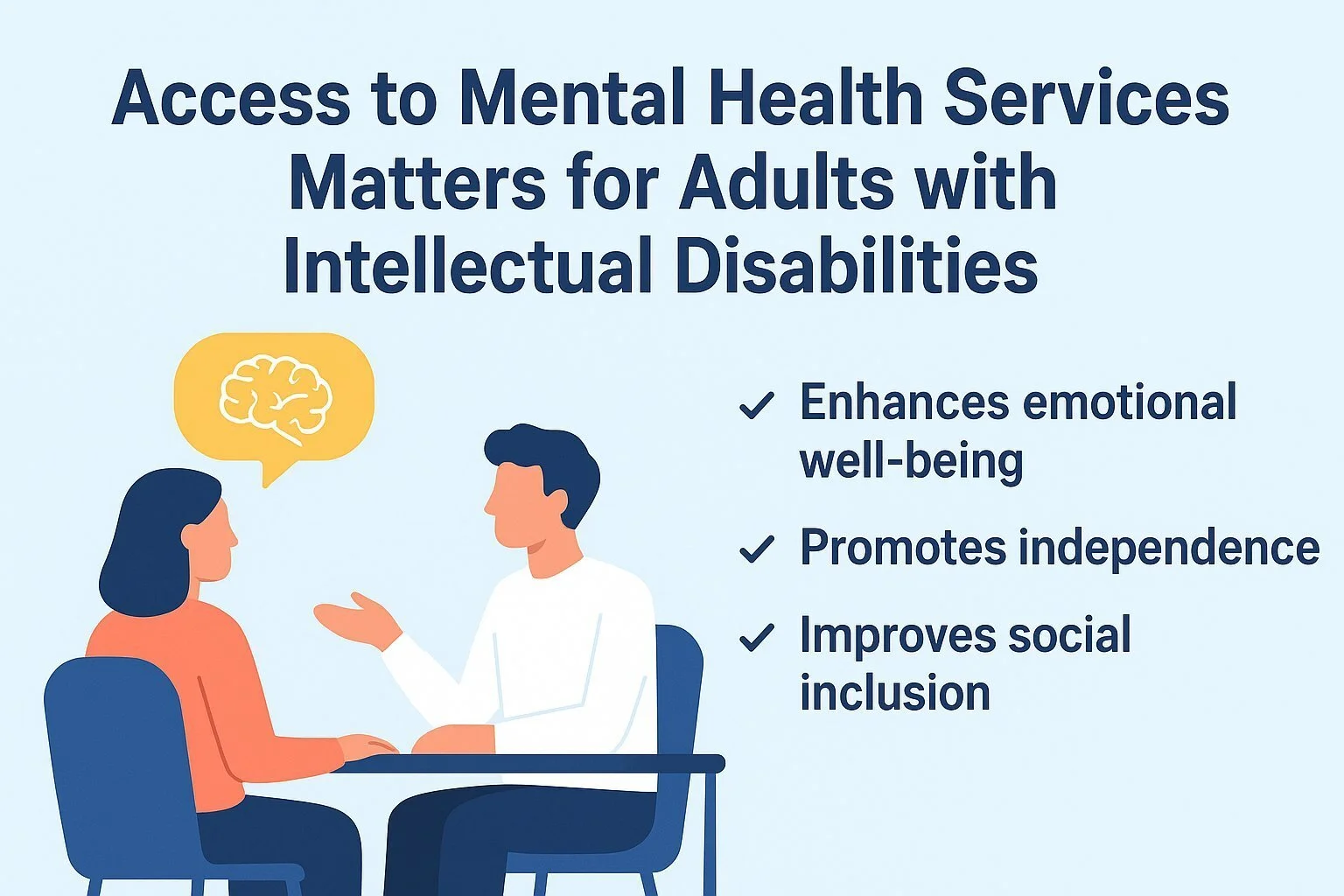Why Access to Mental Health Services Matters for Adults with Intellectual Disabilities?
Intellectual disabilities refer to limitations in intellectual functioning and adaptive behaviors that affect a person’s ability to learn, communicate, and handle everyday tasks independently. Adults living with intellectual disabilities often face challenges in areas such as problem-solving, social interaction, and emotional regulation, which can significantly influence their overall quality of life.
Access to comprehensive mental health services plays a crucial role in supporting their well-being. These services not only help manage emotional and behavioral difficulties but also promote self-confidence, social inclusion, and stability in daily living.
The purpose of this blog is to explore why access to mental health services is essential for adults with intellectual disabilities and how improving these services can foster healthier, more fulfilling lives.
Understand Intellectual Disabilities and Mental Health in Adults
An intellectual disability in adults involves significant limitations in both intellectual functioning and adaptive behavior. These limitations affect areas such as communication, learning, and independent living. For adults, these challenges can make managing work, forming relationships, navigating everyday decisions, and living independently more difficult without appropriate support.
Many adults with IDD or intellectually disabled adults experience additional mental health difficulties, such as anxiety, depression, and behavioral problems. These issues may stem from stress, social isolation, frustration in communication, or environments that are not designed to meet their needs. When mental health services for adults with intellectual disability are delayed or absent, these co-occurring conditions can worsen and reduce quality of life.
The Importance of Accessible Mental Health Services for Adults with Intellectual Disability
Mental health care is essential in improving the lives of disabled adults. Here’s why accessible support matters:
Enhances emotional well-being: Helps individuals manage emotions, anxiety, and behavioral challenges effectively.
Promotes independence: Encourages confidence and self-reliance in daily activities and decision-making.
Improves social inclusion: Supports individuals in building relationships and participating in community life.
Strengthens coping skills: Provides tools to handle stress and adapt to changes more easily.
Boosts overall functioning: Regular therapy and counseling enhance focus, communication, and daily living skills.
Supports families and caregivers: Reduces stress for caregivers and strengthens the overall support system.
Barriers to Accessing Mental Health Services
1. Stigma Around Intellectual Disability and Mental Health
One of the most significant barriers to mental health care for adults with intellectual disabilities is social stigma. Many individuals face negative attitudes or misconceptions that discourage them from seeking help. Families may also hesitate to pursue treatment due to fear of judgment or misunderstanding. This stigma can delay early intervention, which is critical for improving mental and emotional outcomes.
2. Lack of Trained Professionals in Specialized Care
There is a shortage of mental health professionals who are trained to work with individuals with intellectual disabilities. Traditional approaches to therapy may not always suit their communication styles or learning abilities. As a result, people with intellectual disabilities may receive care that does not fully address their unique needs. Expanding training programs and increasing awareness among healthcare providers is essential to ensure effective, personalized treatment.
3. Financial and Systemic Barriers
Financial limitations often prevent individuals and families from accessing consistent mental health services. Insurance coverage for specialized therapy or long-term care is sometimes inadequate. In addition, there may be limited availability of programs in certain areas, especially rural communities. These systemic challenges can leave many adults without the ongoing support they require for emotional and behavioral stability.
4. Communication Challenges in Diagnosis and Treatment
Accurate diagnosis and treatment can be difficult when individuals struggle to express their thoughts, feelings, or symptoms clearly. Communication barriers may lead to misinterpretation of behaviors, resulting in incorrect or incomplete treatment plans. Professionals who understand how to adapt communication techniques and use supportive tools can greatly improve the accuracy and effectiveness of mental health interventions for this population.
Benefits of Timely and Appropriate Support
1. Better Emotional Regulation and Coping Strategies
Early and consistent access to mental health services helps adults with intellectual disabilities develop healthy ways to understand and manage their emotions. With the right therapeutic support, individuals learn coping strategies to handle stress, frustration, and change more effectively. This emotional stability enhances self-confidence and contributes to overall well-being.
2. Improved Participation in Education, Work, and Community Life
When mental health needs are addressed in a timely manner, individuals are better equipped to engage in educational, vocational, and social activities. Structured therapy and skill-building programs promote self-reliance, helping disabled adults take part in community programs, pursue employment opportunities, and enjoy a more active social life.
3. Reduced Risk of Crises or Hospitalizations
Proper mental health support can prevent emotional or behavioral challenges from escalating into crises that require emergency intervention or hospitalization. Regular counseling, early detection of symptoms, and continuous follow-up care help maintain stability and reduce the frequency of severe episodes. Preventive care ensures that individuals can live safely and comfortably in familiar environments.
Stronger Support Network for Families and Caregivers
When adults with intellectual disabilities receive the care they need, it also strengthens the well-being of their families and caregivers. Professional guidance equips caregivers with strategies to manage behavioral challenges and maintain positive relationships. This shared understanding fosters a sense of teamwork and balance within the home, ensuring that both individuals and their support networks thrive together.
Steps Toward Better Access
1. Expanding Community-Based Programs
Creating more community-based mental health programs is one of the most effective ways to ensure that adults with intellectual disabilities receive consistent and inclusive care. Local initiatives can provide group therapy, peer support, and recreational activities that encourage social participation. Community settings also promote familiarity and comfort, helping individuals build trust and engage more actively in their treatment.
2. Training Healthcare Professionals in Intellectual Disability Care
Comprehensive training for healthcare professionals is essential to improve the quality of mental health care. Specialists should be equipped with the skills to recognize symptoms, adapt communication methods, and deliver therapy suited to different cognitive abilities. When mental health practitioners understand the unique needs of adults with intellectual disabilities, it leads to more accurate diagnoses and effective, compassionate care.
3. Leveraging Technology and Telehealth Solutions
Technology can significantly enhance access to mental health services. Telehealth platforms allow adults with intellectual disabilities to attend therapy sessions from their homes, reducing travel barriers and increasing consistency in care. Digital tools and apps designed for accessibility can also help track emotions, routines, and progress, providing valuable insights for both individuals and caregivers.
4. Policy Improvements and Advocacy Efforts
Stronger policies and advocacy are vital for long-term progress. Governments and organizations should prioritize funding for mental health services and create inclusive health policies that address the needs of people with intellectual disabilities. Advocacy groups play an important role in raising awareness, fighting stigma, and ensuring that individuals and families have equal access to the resources they deserve.
Conclusion
Access to mental health services for adults with intellectual disability is vital for improving emotional health, independence, and quality of life. With timely support, individuals can develop coping skills, form stronger connections, and participate more fully in their communities. Quality care also empowers families and contributes to a more inclusive society.
At Elevate Ability, we believe in creating meaningful change through education and support. Our specialized coaching programs are designed to help caregivers and professionals develop compassionate, effective, and empowering strategies for working with intellectually disabled adults. Together, we can build stronger communities where every individual has the opportunity to thrive.

